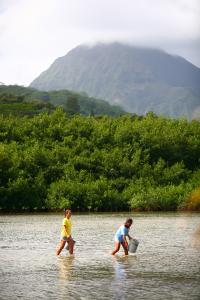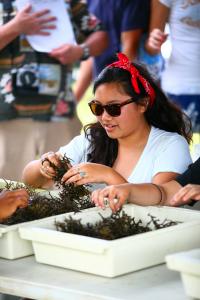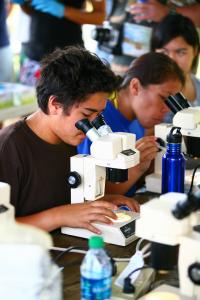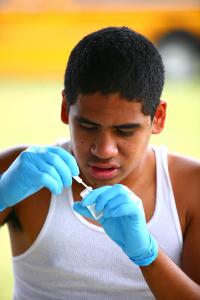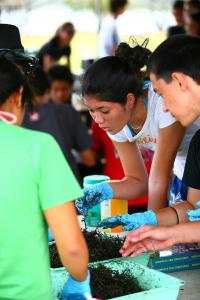$3.5M grant for limu research center at Windward CC
Windward Community CollegeMarketing Communications Director, Chancellor's Office
Ardis Eschenberg, (808) 235-7402
Chancellor, Windward Community College
The Kiaʻi Loko Center for Limu Research, created and managed by Windward Community College, has received a $3.5 million grant to provide education and limu (algae) research opportunities for the long-term benefits for the Windward community. The grant is from the National Science Foundation’s Tribal Colleges and Universities Program (TCUP).
The center focuses on applying traditional Native Hawaiian knowledge alongside Western scientific methods to study questions important to Native Hawaiians about limu and the traditional Hawaiian fishpond. Aquacultural practices employed in maintaining healthy fishponds and producing limu are essential aspects of traditional Native Hawaiian lifestyles that contribute to critical contemporary issues such as food security, biodiversity and cultural perpetuation.
The five-year objectives are to partner with community members, Native Hawaiian cultural experts and STEM professionals in engaging 120 Native Hawaiian high school and college students in culturally relevant STEM courses, student internships and the completion of STEM certificates that prepare students for positions as aquaculture technicians.
“The limu center builds on the strengths of our Windward side—our community and how we practice laulima (cooperation) to grow our ‘ōpio (young people). Together with our high schools, Pacific American Foundation, Waimānalo Limu Hui, Sea Grant and others, we will grow science that is pili (connected) to who we are and impactful for those we love,” said Chancellor Ardis Eschenberg.
In recent years, interest in algae cultivation has risen for uses such as renewable biofuels, nutraceuticals, human foods, nutritional supplements, livestock and aquaculture feeds, wastewater cleanup and carbon dioxide sequestration. In addition, algae culture promises to support the development of new industries for the state of Hawaiʻi.
Research leading to jobs
Student-led research will address limu-related issues important to Native Hawaiian people, advancing the knowledge base surrounding limu ecology and production.
“The Kiaʻi Loko Center for Limu Research will train students to work in an important emerging industry promoting sustainability and self-reliance in these islands,” said Dave Krupp, dean of sciences at Windward CC. “Working with our partners, we will serve our Koʻolaupoko and Koʻolauloa communities to solve issues of concern such as the restoration of native limu to our reefs and elimination of invasive seaweeds.”
Based on an Algae Technology Education Consortium survey, there is a significant need in the U.S. for a trained algae-based workforce (projecting more than 11,500 jobs nationally; salaries over $40,000 per year) in both the algae farming and biomanufacturing sectors.
Because Hawaiʻi has a unique position in algae cultivation, such as relatively consistent warm temperatures, sunshine, cold deep, nutrient-rich ocean water and limited traditional farming resources, most of these algae-based jobs are projected to be located in Hawaiʻi; about 5,000 job opportunities in algae cultivation, harvesting and processing; and approximately 5,000 job opportunities in algal biomanufacturing and fermentation.
“This (grant) is recognition that place-based education can create nationally recognized opportunities for our kids. We have the means and the talent to compete at the highest levels,” said Sen. Jarrett Keohokalole.
New algae culture pathway certificate
The center has two primary goals:
- advancing cross-disciplinary knowledge of aquaculture and limu ecology in support of community needs; and
- training the next generation of Native Hawaiian STEM professionals knowledgeable in aquaculture and limu ecology.
With these goals in mind, Windward CC is creating an algae culture pathway as a certificate of competence within the Agripharmatech Certificate of Achievement, providing opportunities to generate a skilled workforce for algae-based bioproducts and other related fields, such as wastewater treatment, biotechnology and multitrophic aquaculture. This will also serve as a pathway for higher-value credentials and transfer to four-year institutions.
Students will have internship opportunities with various organizations, such as the Pacific American Foundation (PAF) experimental multitrophic aquaculture work at Waikalua Loko Iʻa, a traditional fishpond in Kāneʻohe. PAF works closely with the Hawaiʻi Institute of Marine Biology and the UH Sea Grant College Program in these efforts.
“This grant opportunity culminates over 28 years of a relationship between Windward CC, PAF and the community we serve; it reflects a continued dedication to applying learning and Indigenous loko i‘a practices to help nurture and feed our community again. Imua hou! (onward!)” said Herb Lee, Jr., PAF CEO and president.
Center for STEM and culture
A goal of TCUP is to promote the advancement of intellectual leadership within institutions that will support them in addressing the scientific or engineering priorities of their tribes and communities. Linked with this goal is the Tribal Colleges and Universities Enterprise Advancement Centers (TEA Centers) funding strand to support and promote the STEM goals, needs, aspirations or interests of the chartering reservation or tribe(s).
The Kiaʻi Loko Center for Limu Research aligns with the TEA Center concept in the significant positive impacts it will have on the Native Hawaiian community and Native Hawaiian culture.
For more information on the grant and new algae culture pathway, contact Krupp at krupp@hawaii.edu.
For more information, visit: http://windward.hawaii.edu

